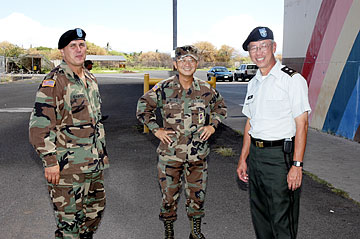
STAR-BULLETIN / 2006
Brig. Gen. Joe Chaves, left, took command of the Hawaii Army National Guard from Brig. Gen. Vern Miyagi, center, yesterday. Also pictured is Maj. Gen. Bob Lee, head of the Hawaii Army and Air National Guard.
|
|
Chaves takes over at Hawaii Army National Guard
Outgoing commander Miyagi gets a two-star job at Camp Smith
Associated Press
Brig. Gen. Joseph J. Chaves took command of the Hawaii Army National Guard during a ceremony yesterday attended by hundreds of soldiers, state officials and military leaders.
Chaves is taking over for Brig. Gen. Vern T. Miyagi, who has overseen the state Army National Guard for three years, said Maj. Charles Anthony, a spokesman for the Hawaii National Guard.
Chaves will be in charge of overall training and equipping of the National Guard troops, which include the 29th Separate Infantry Brigade, the 111th Army Band, the 103rd Troop Command and the 298th Regional Training Institute.
At the ceremony, Miyagi passed the colors of the Hawaii Army National Guard to Maj. Gen. Robert Lee, who then gave them to Chaves.
"Even though uniforms and people will change over the years, the colors will remain a constant," Anthony said. "They're a symbolic reminder of the heritage of the National Guard."
Miyagi will take on a new role handling Reserve affairs with the U.S. Pacific Command, which is a two-star general position, Anthony said. The leadership of the Hawaii Army National Guard is a one-star general position.
Gov. Linda Lingle and Lee spoke highly of Miyagi's accomplishments, from his days as a lieutenant to a military career that has included most of the positions of authority in the Hawaii Army National Guard.
Lingle presented him with a state award, the Distinguished Service Order, Anthony said.
Chaves' most recent job was as the commander for the 29th Separate Infantry Brigade, and he will retain that post in his new job.
Five out of every six soldiers in the Hawaii Army National Guard have been mobilized for active duty to locations including Iraq and Afghanistan over the last 18 months, Anthony said.
They have all returned to Hawaii. The last 60 soldiers came home April 4, Anthony said.
"For those groups that have been mobilized, we would not anticipate having them mobilized again within the next five years or more," he said.

